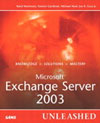Mysterious Exchange migration stopped; issuing a complex password challenge to users that they might actually like.
- By Bill Boswell
- June 15, 2004
How to handle the growing problem that is the BadMail folder.
- By Bill Boswell
- June 08, 2004
Control software updates, even for remote workers.
- By Don Jones
- June 02, 2004

If you need to dig into the guts, this book may be for you. Then again, maybe not.
- By Doug Barney
- June 01, 2004

One thousand pages of pure modern messaging insight
- By Doug Barney
- June 01, 2004
Find out how to import Contacts and User Objects into Active Directory, as well as modify batched objects.
- By Don Jones
- June 01, 2004
Boot-up is a dangerous time for your systems, a time before security policies to protect them may be active. Avoid danger with persistent policies.
- By Roberta Bragg
- June 01, 2004

You can buy a lot for $1,000 these days. We test four bargain-basement boxes and tell you what to expect.
- By Mike Gunderloy
- June 01, 2004
Microsoft’s next Service Pack for Windows XP is almost totally about improved security. And it shows.
- By Bill Boswell
- June 01, 2004

Group policy can make your life as an administrator blissful or stressful.
Learn from one expert’s experiences what works with group policies, and what doesn’t.
- By Jeremy Moskowitz
- June 01, 2004
This tool allows you to do various things using different rights/credentials.
- By Danielle Ruest and Nelson Ruest
- June 01, 2004
As part of the June cover feature, "4 Dirt-Cheap Workgroup Servers," Microsoft Small Business Server 2003 might interest those small and medium businesses.
- By Mike Gunderloy
- June 01, 2004
Admin wants to maintain snappy performance with user profiles and home folders with a Windows 2003 network upgrade.
- By Bill Boswell
- June 01, 2004
As part of the June cover feature, "4 Dirt-Cheap Workgroup Servers," Microsoft Small Business Server 2003 also comes with a Backup Configuration Wizard. Here are two add-on products that offer help.
- By Mike Gunderloy
- June 01, 2004
KerbTray helped this reader figure out what was making his Exchange server sick.
- By Bill Boswell
- May 25, 2004